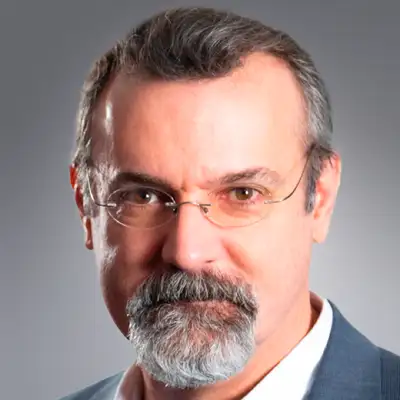2024: The Year in Review — December 16, 2024
Hello, and welcome to the economic and market watch podcast for the week of 12/16/2024. This is John Suter, Sam Kim, and Antony Davies of CFC. This is our year end review. So we're going to discuss what bothered us most during the year in terms of the economy. And so we're gonna start off with Antony and let him give his his biggest concern to start.
Antony Davies:What bothered me the most was an apparent return to mercantilism, this idea that the way a country becomes rich is by exporting but not importing. This idea was in vogue back in the sixteen hundreds, seventeen hundreds. Economists put that theory to bed two hundred years ago, and now it's cropping up again. What we've come to find is that the strongest force in economics comes from people specializing and exchanging.
Antony Davies:You do what you're good at, and I do what I'm good at and we exchange and we both end up better off. That same principle that exists amongst individuals also exists at the country level. And so when we start to talk about things like, well, we should impose tariffs and prevent imports into the country, we're backing away from that. We're forcing our country to to do the opposite of specialization. And that's gonna be bad for, well, for most of us.
John Suter:And what about you, Sam?
Sam Kem:So, I recently read a great article on the Financial Times and it's called "The Mother of All Bubbles." The reason I really like the article is that it sums up pretty much what bothers me the most. The US capital market is probably more inflated than ever. US accounts for nearly 70% of the leading global stock index, while our GDP accounts for only 27 of the global economy. It's true that The US economy is doing better than other advanced economies, so some of this is justified.
Sam Kem:But the majority of it is not because while we're doing better than other advanced economies, we're not doing better than emerging economies. Again, the gap between the size of our share of the leading global stock index, which is almost 70%, and our share of the global economy, which is only 27%, says it all. In addition, The US now attracts more than 70% of the capital flows in the global market for private investments. While this may sound good for US borrowers, there's a big downside to this for the rest of the world as well as the US. And I will cover that later in another episode, so look out for that in 2025.
John Suter:And bringing up the rear for me, what really kind of bothered me the most was American's doomsday outlook on The US economy leading up to the presidential election. While I do realize that there's some pockets of weaknesses across America, if you look at the overall macroeconomic themes that represent our economy, the numbers for the incoming president-elect Trump look relatively solid. For example, real US GDP is expected to end the year at 2.7%. That's more than half a percent stronger than our historical average of 2%. It might not seem like much, but multiply that half a percent by a $30,000,000,000,000 economy.
John Suter:The labor market has also continued to defy expectations. It's been the pillar of strength. We've added 1,900,000 jobs this year alone. The current unemployment rate stands at 4.2%, just above the 3.4% achieved back in January of 2023. The labor participation, for prime age workers from age 24 to 54 is at 83.5%, just below the all time high of 84.6% achieved back in January 1999.
John Suter:So the labor market is the biggest reason why the United States did not fall into recession this year even though the majority of economists had forecasted that because of high inflation and high interest rates. That said, this labor market is troublesome in the standpoint that it's characterized by low hiring and low firing. It's a great time if you already have a job, but maybe not so great if you're looking for one.
Antony Davies:Alright. New question. What did each of you think was the biggest economic surprise of 2024?
John Suter:That's an easy one for me because I would have bet the farm that the Fed was only gonna go 25 basis points in September when we're thinking about lowering interest rates. I was totally shocked that they went 50 right out of the gate. Inflation has come down. It's trending in the right direction. Both the headline CPI and the core personal consumption expenditure index is below 3%.
John Suter:We do know that that last mile of bringing inflation down is going to be a long one, but to come right out of the box at 50 basis points, from the get go was very, shocking to me. The upcoming December 18 meeting, the last one of this year, it's probably a coin flip. Whether they ease or not, I'm gonna go out on a limb saying that they will ease by 25 basis points and end the the year out. But next year, look out. It could be a totally different story.
Sam Kem:Well, I agree with that. This is another example of what I say to our members when I say, what I think the Fed should do is not necessarily the same as what the Fed will do. I thought then and I still think now that cutting rates by 50 basis points was a mistake. In fact, I had a conversation with someone who works at the Fed and they too thought that they were surprised by the decision. They thought that the Fed was gonna cut by 25 basis points in September, and it turned out to be 50 basis points. They were so sure that it was going to be 25, but it turned out to be 50.
Sam Kem:The Fed always claims to be data driven, but the question is what data exactly are driving their decisions? Now we're looking at growth data. That does not justify a 50 basis point cut. When you're looking at inflation data, while inflation did come down from its peak, we've seen that it had been stubborn for the most part.
Sam Kem:When you look at wage inflation, it had been running mostly far above 3%, and 3% is supposed to be the the target rate for the Fed. So what exactly is this data that's driving the Fed decision? Because none of this is justifying that 50 basis points.
Antony Davies:Yeah. I'm with both of you. The biggest surprise to me was the Fed cut, but I'll go even further. I was surprised the Fed cut at all. If you look at the data prior to their first cut in 2024, both or all three of these things, their balance sheet, inflation, and the money supply were all on track to go back to their pre-COVID levels by 2025.
Antony Davies:So based on that, I looked at the data and said, well, if the Fed does nothing by mid twenty twenty five, we're back to where we started prior to COVID. Therefore, don't expect to cut until 2025. And the Fed went in cut not only did it cut, it cut 75 basis points. And what's emerged is in in my mind what you would expect. That is that there's signals throughout that inflation may be coming back, that it was, at the very best. It's stabilized at a level that's higher than what it was prior to COVID.
Antony Davies:All of that is consistent with the Fed having acted too soon.
John Suter:Now we have Kathy Ryan, our producer, who's going to discuss the top three podcasts we had in 2024.
Kathy Ryan:The number three most listened to episode was one of Sam's. It's "The True Cost of Renewable Energy." That's a discussion you had with Alicia Pinto from the the utility research and policy team.
Sam Kem:This is definitely one of my favorite episodes. It has a flavor of everything. One, it was requested by one of our listeners, so let me remind everybody that you too can request a topic. And two, it was a collaboration between our economic research team and the industry team. And finally, three, it's definitely a relevant topic for our members.
Sam Kem:For the general public, the idea of renewable energy is probably seen as more of an environmental issue. For investors, it's an investment opportunity. But in reality, and our members know this, it's about powering the economy in the face of financial, environmental, and policy challenges. It's about striking the right balance at an unknown and possibly huge cost. Consumers don't wake up every morning thinking about where their electricity is coming from. They don't start their day thinking of the potential blackout. What they think about and what they see is the rising cost of their electricity bills.
Sam Kem:In the Census Bureau of households pulse surveys in the summer of this year, about 28% of all households reported reducing or foregoing necessities such as food and medicine in order to pay an energy bill in the last twelve months. For low income families, that figure is a striking 50%. So as you can see, although people don't think about power generation, the impact it has on people is enormous.
Sam Kem:Obviously, the topic of true cost of renewables is far more complex than a five minute episode could do, but I'm really glad that we took a look at it.
Kathy Ryan:So the number two most popular episode for the year was one of John's. It's the troubled state of Social Security.
John Suter:Yes. This is a major funding source for many Americans. Roughly 40% of older Americans rely solely on Social Security for their retirement income. And so the question is, Social Security is supposed to run out of money by the mid 2030s. How do we shore this up?
John Suter:Our leaders in Washington have not addressed the topic. They keep kicking the can down the road, but yet it's such an important facet of our society that some solution has to come forth. The most popular solution, if I remember correctly, was to tax on billionaires to plug the hole. The least popular was raising the retirement age from 65 to something higher. So the thing is that it's a very important program and everybody is interested in what a possible solution is and what the impact may be, and we still don't have one as of today.
Kathy Ryan:And the most popular episode of the year also dealt with retirement. Antony, that was your piece on "The Retirement Savings Error Too Many People Make."
Antony Davies:This is an easy one. The error that people make is waiting until it's too late to start thinking about retirement. And I talked to—I have in my previous life talked to high school students across the country, and I tell them all, look. You can become millionaires. All you have to do is start at age 20 and save $60 a week.
Antony Davies:That's if you break it down, like, what, the price of a bacon, egg, cheese combo once a day at McDonald's? So basically, the price of lunch once a day, you can become a millionaire by the time you retire. People don't believe me. Right? You could sit down and do the math and work this thing out.
Antony Davies:But at a gut level, it's not until people hit hit their forties or fifties that they realize that, oh, retirement really is a thing and it's coming that they sit down and say, oh, okay. Now it's time to skip the McDonald's lunch every day and I'll save and become a millionaire. No. It's way too late at that point. What you've got going for you is time.
Antony Davies:That's the most powerful weapon to saving. The sooner you start, the better off you'll be.
John Suter:So there you have it. We're taking a year end hiatus from the Economic & Market Watch email newsletter, intelligence brief, and dashboard. In previous years, we put the podcast on hiatus too, but this time we thought we might bring you something for the holidays. We're calling it First Lessons in Economics. We won't be sending out an email for this one, but it will show up in your podcast app and on the economic and market watch page around New Year's.
John Suter:That's it for today, and be sure to download the economic and market watch intelligence brief and dashboard. As a team, we wish you all a
The Whole Team:Happy Holidays!
Creators and Guests



